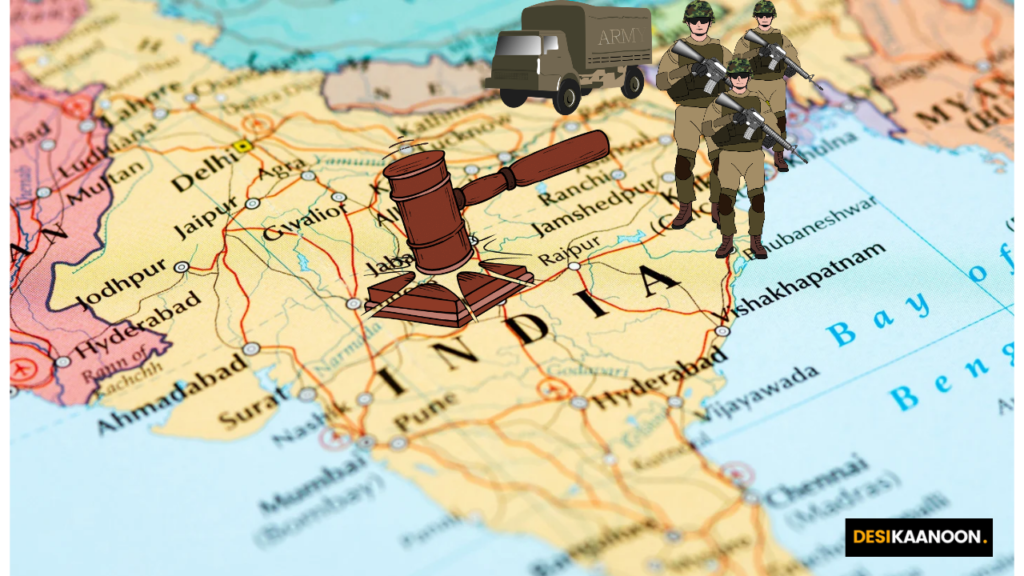Aastha Pareek
The issue of illegal migration has long posed significant challenges to the security, economy, and social fabric of border states. In recent years, these challenges have only intensified, with increasing pressure on local governments to address the associated legal, social, and humanitarian concerns. In response to these complexities, the Supreme Court of India has taken an active role in advocating for stronger policies and legislative frameworks aimed at controlling illegal migration in border states. This article examines the recent directives of the Supreme Court, their implications for national security, and the potential legal reforms necessary to address the problem.
Illegal migration, particularly in states bordering neighboring countries such as Bangladesh, Myanmar, and Pakistan, has been a subject of extensive litigation and debate. Border states like Assam, West Bengal, and the northeastern states have long reported a significant influx of undocumented migrants. These migrations often strain local resources, fuel social tensions, and create security risks by potentially harboring elements that could jeopardize national security.
The Constitution of India under guarantees the right to life and liberty to all individuals, irrespective of their nationality under Article 21. However, the same must be balanced against the sovereign rights of the state to regulate its borders and ensure the safety and welfare of its citizens.
In a landmark judgment, the Supreme Court reiterated the need for stringent measures to address the issue of illegal migration. It noted that lax enforcement of immigration laws and insufficient monitoring of border areas have exacerbated the crisis. The Court, while addressing a batch of petitions, underscored that illegal migration not only threatens the demographic composition of the region but also creates economic and social hardships for the local population.
The bench, headed by Chief Justice DY Chandrachud, emphasized the importance of a multi-pronged approach, which should include both preventive and remedial strategies. This includes the implementation of strict border control measures, enhancing the capabilities of border security forces, and strengthening bilateral agreements with neighboring countries to facilitate repatriation.
The Supreme Court’s recent directives to the central and state governments highlighted key areas that require immediate reform:
1. Border Security Enhancement: The Court called for the augmentation of border infrastructure, including the erection of fencing, surveillance technology, and patrolling to ensure that unauthorized entries are minimized. The need to deploy modern technology, such as drones and satellite surveillance, was also emphasized to monitor remote areas.
2. Streamlining the Detection and Deportation Process: The Court noted that the current process of detecting illegal migrants is inefficient, leading to prolonged legal battles and overcrowded detention centers. It recommended that the government create fast-track courts dedicated to adjudicating cases of illegal migration and expediting the deportation process.
3. Strengthening Bilateral Relations: The repatriation of illegal migrants has historically been a diplomatic challenge. The Court urged the government to engage in meaningful diplomatic negotiations with neighboring countries to streamline the repatriation process and ensure that migrants are returned to their countries of origin in a timely and humane manner.
4. National Register of Citizens (NRC): In states such as Assam, where the issue of illegal migration is deeply entrenched, the Supreme Court recognized the National Register of Citizens as a critical tool in identifying and addressing the issue of undocumented migrants. The Court urged the central government to consider implementing similar mechanisms in other border states, after ensuring that due process is followed to prevent any human rights violations.
5. Coordination Between Central and State Governments: The Court noted that illegal migration is a national issue and cannot be tackled effectively by individual states alone. It recommended the formation of a high-level committee comprising representatives from both central and state governments to coordinate border security efforts, share intelligence, and monitor the effectiveness of policies.
The Supreme Court’s directives call for a careful balance between human rights obligations and national security concerns. The enforcement of strict immigration laws must be aligned with constitutional protections, especially in light of the due process rights guaranteed under Articles 14 and 21 of the Constitution. The Court has clarified that while border security is paramount, any measures taken must be within the bounds of constitutional law, ensuring that individuals’ rights are protected throughout the deportation process.
However, these policies raise questions about the legal status of long-term residents who may not have documentation to prove their citizenship. The Court’s advocacy for the NRC has reignited debates over the potential disenfranchisement of individuals who may be unjustly labeled as illegal migrants due to bureaucratic inefficiencies.
The Supreme Court’s proactive stance on the issue of illegal migration is a crucial step towards ensuring the security and stability of India’s border states. By advocating for stronger policies, better coordination between governments, and the use of modern technology, the Court has set a blueprint for the comprehensive management of illegal migration. However, the execution of these recommendations must be done with great care to ensure that constitutional rights are upheld and that the dignity of every individual is respected, even as the state seeks to protect its borders.
The future of India’s immigration policy now hinges on the effective implementation of these judicial directives, the cooperation between central and state governments, and the international diplomatic measures taken to address the is sue in a just and humane manner.

